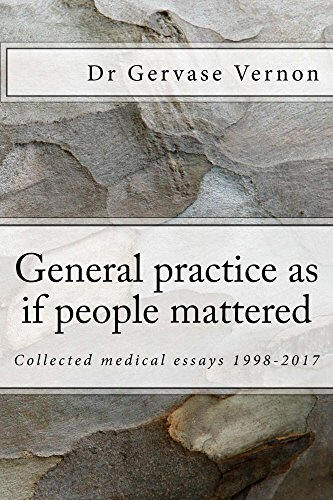Catholic Medical Quarterly Volume 71(3) August 2021
Book Review
General Practice as if people mattered.
Collected medical essays
1998-2017
by Dr Gervase Vernon
Pub. 2018 Independent Publishing Platform, ISBN
978-1984360168
Review by Dr Pravin Thevasathan.
 When I first started reading this, I randomly came across a chapter on
medical statistics. This led to some flashbacks of large, cold examination
halls in Central London and I quickly moved on to another book. I am
extremely glad I have now given this book a second chance. It is very
good. And that includes the chapter on statistics!
When I first started reading this, I randomly came across a chapter on
medical statistics. This led to some flashbacks of large, cold examination
halls in Central London and I quickly moved on to another book. I am
extremely glad I have now given this book a second chance. It is very
good. And that includes the chapter on statistics!
There are those of us in health care who are passionate about the rights of the unborn and the vulnerable and elderly who may be coerced into assisted suicide. Then there are those who are passionate about the plight of asylum seekers and the less well off. This book reminds us that the virtuous person working in health care should be concerned about all these different groups. The author has been a hospital doctor in Malawi. a GP in Essex and has worked for a charity that supports the victims of torture. He is therefore in a very good position to put forward his case.
The person-centred professional is aware of recent scientific advances but is equally aware of their limitations. Medicine is an art that is not something achieved once and for all but rather challenged each day. Experience really matters. We need to continue to gain experience on how to dialogue. Is it possible for a doctor to enter into a moral dialogue with a woman intending to have an abortion? Yes, says the author. What is needed is unhurried listening, respect for the patient's autonomy and respect for the doctor's own integrity. The author notes: "many women who choose to opt for termination do continue their doctor-patient relationship with me" in spite or perhaps because the doctor made his own views clear.
The author looks at two contemporary attempts to see if moral dialogue is possible. The first is the Four Principles approach. There are limitations to this approach. The choice of principles appears arbitrary. They appear not to cover all moral principles. At best, they can only offer a framework for making moral decisions. Then there is virtue ethics. The great virtue ethicist Alasdair MacIntyre believes that the enlightenment project of replacing an ethics linked to the proper end of man with one based on subjective reason was misplaced. In fact, it has failed. I recall medical ethics courses involving Kantians and Utilitarians arguing with each other and actually getting nowhere. What is needed, says the virtue ethicist, is to act virtuously in all areas of life. And this is always within a social tradition. As with the Four Principles, virtue theory gives us a way of thinking about moral actions but it too has limitations. It will not help us much in judging between right and wrong in a particular case.
I am fairly sure that the author would agree with me that what is needed is an updated version of the natural law tradition. Perhaps natural law combined with virtue ethics?
The chapter on Immunisation policy is highly pertinent. There have been protests against immunisation from the days of smallpox vaccinations. In a free society, it has been necessary to allow for conscientious objection. A top down policy is not the best approach. We need good public information campaigns. We need to listen to people and take their concerns seriously.But we also need to correct mistaken beliefs.
Seeing people within a social context made me reflect on how I might deal with a fully competent patient asking for assisted suicide if assisted suicide is legalised. The disability rights groups have good reason to fear that more vulnerable persons are going to be put at risk. In Oregon, very few people are asking for assisted suicide because of unbearable pain. A lot more ask for it because they feel they are a burden on society. People matter. The person I am seeing as a patient in front of me matters. But he matters within a social context. There should be no absolute right to autonomy.
I found this to be an excellent and thoroughly enjoyable read.
